Candidates for Leadership
The Academy will conduct its 2011 annual Board of Directors selection with online balloting, in an effort to streamline the voting process and increase participation. The official candidate statements are as printed in this issue of the Bulletin. In early June, you will receive an email instructing you on the voting process. To ensure you can participate, you must be a member in good standing, and the Academy must have an active email address for you. To update your profile, log in at http://www.entnet.org/Community/memberProfile.cfm. Candidates for President-Elect (vote for one) Michael S. Benninger, MD Identify two strengths and vulnerabilities of our Academy and explain how you would propose to leverage those strengths and overcome those vulnerabilities to ensure future stability and success of the organization. In the context of the Academy’s Strategic Plan, what changes do you envision will be necessary in our Academy over the next three to five years in order to meet the educational, research, advocacy, and fiscal challenges presented by evolving healthcare policy and legislation? What is the most important issue facing otolaryngology—head and neck surgery, as a profession, in the next two to three years? I have had a remarkable opportunity to contribute to the American Academy of Otolaryngology—Head and Neck Surgery as Chairman of the Board of Governors, Vice President, and Journal Editor. My 11 years on the Board of Directors have allowed me to see our many great strengths and resources. The most significant of these are the remarkable involvement of our engaged membership and a great balance between academic and private practice otolaryngologists. The Academy needs to continue to provide a broad set of resources for all of our members. Despite these strengths, we have vulnerabilities. The implementation of healthcare reform and the ever-changing socio-economic and legislative environments will challenge us moving forward. There is a risk that we will be fractioned by pressures to maintain our practices, defend against other groups trying to expand their scope of practice into our areas, and meeting government and payer mandates. The future of otolaryngology and the role of the Academy in designing that future will require that we continue to come together as one specialty to represent the needs of our patients. This will require sustaining an engaged membership, strengthening our development of dedicated members and future leaders, and collaborating between our sister societies. The future of the Academy is driven by our strategic vision and planning and there are a number of key objectives that need to be prioritized. The financial stability of the Academy is crucial to sustaining a strong membership and advocating for the ongoing member needs through our legislative, practice management, and academic agendas. We have to ensure that the costs of maintaining the Academy’s support structure yield the highest value on return and members’ dues are used wisely, so that we can grow our membership, and engage our members to be more active politically both for responding to healthcare reform and to support the growth of our practices. Although we have many issues that will be facing our specialty, the overall shortage and maldistribution of otolaryngologists will challenge our ability to provide quality, equitable care. Although the impact of this worsening shortfall may be a few years off, we need to be proactive in evaluating the long-term threats to our practices and in finding solutions to improve distribution of ENT care, assuring access for patients, and protecting our critical roles. We must ensure that the coordination of care for the management of patients with otolaryngologic disorders needs to remain with the otolaryngologist. Our challenge is to meet this demand and distribution while retaining the critical role of supporting the best quality, safety, and appropriate care for our patients. A clear part of this is protecting and growing our practices, our practices that define the highest quality for otolaryngology patients. It is imperative that we advocate for appropriate reimbursement and fair policies through both government and private payers and continue to promote ethical but significant malpractice and tort reform. A focused Academy, an engaged membership, and experienced, strong leadership will allow us to meet these challenges. James L. Netterville, MD Identify two strengths and vulnerabilities of our Academy and explain how you would propose to leverage those strengths and overcome those vulnerabilities to ensure future stability and success of the organization. In the context of the Academy’s Strategic Plan, what changes do you envision will be necessary in our Academy over the next three to five years in order to meet the educational, research, advocacy, and fiscal challenges presented by evolving healthcare policy and legislation? What is the most important issue facing otolaryngology—head and neck surgery, as a profession, in the next two to three years? I am humbled, and honored, to be nominated for the role of President of our Academy. Throughout my career I have gained immensely from my membership in the Academy, and the benefits it offers to each of us. I am indebted to many of you, who sacrificed your time and energy to create this strong vibrant Academy. At this point in my life, I would cherish the opportunity to give back to the AAO-HNSF, to each of you as fellow members, by serving you through this position, a position of service to all who make up our Academy. One of the remarkable strengths of our Academy is its extremely dedicated and well-trained workforce. Simply stated: each of you. The vast majority of you are highly respected in your communities for your service to your patients and the world around you. I have observed many of you, as you not only provide excellent care to your patients, but as you work in the community, serve through nonprofit efforts, head up church service programs, while many of you spend vacation time serving the poor through foreign medical missions. Many of you quietly serve at home as you unselfishly bring that segment of uninsured patients into your office and treat them with the same care and compassion as the insured patient in the adjoining room. Yet this excellent reputation built over many years of dedicated service is very vulnerable as we surgeons are being framed by our current health care reform as the “bad guys,” the “problem” that is responsible for rising cost of health care. Another remarkable strength is our education programs. However, we have been educated in vertical silos. Our vulnerability is not the quality of our education but what we are being educated about. We are lacking in our education on healthcare policy, and how to negotiate and work with other individuals and groups who will be seated at the healthcare reform table. A critical shift of our strategic plan will allow us to use these strengths to overcome these vulnerabilities. Through an Academy-sponsored national grid of outcomes data, we must function as a team to pool our data, to define the standards of quality head and neck care, and to demonstrate that we are uniquely qualified to deliver the most efficient, cost-effective ENT care. From this position of strength we can then frame ourselves as the quality care providers of all ENT care. We can then decide what we treat and what we allow others to triage for us within the looming framework of accountable care organizations and bundled care payments. The most important issue facing not just otolaryngology—head and neck surgery, but all of medicine, is the unknowns of the massive healthcare reform that is staring us in the eyes. It is reality, something must change in how we deliver and pay for healthcare. We must rapidly pass through our denial and anger in order to become meaningful players at the healthcare reform table. Otherwise we will be marginalized, and others will dictate our paths for us. Candidates for Secretary-Treasurer-Elect (vote for one) What is your particular experience or interest that would make you an effective Secretary-Treasurer of the Academy? Gavin Setzen, MD I have been deeply involved in the Academy since completing my residency. I am a private practitioner and president of a single-specialty group, with an academic faculty appointment, and I understand the complexities and challenges facing all otolaryngologists in the United States. It is imperative that the fiscal security and viability of our Academy be ensured, consistent with our strategic plan, so that we are able to provide education, research, and advocacy, coupled with a broad array of membership services to our members and the patients we serve. I have held numerous leadership positions in the Academy, in organized medicine and in several community nonprofit organizations. I have developed executive, finance, and governance experience that qualifies me for this position. I have chaired the Board of Governors (BOG) Socioeconomic & Grassroots Committee and Legislative Representatives Committee for several years and was Secretary and Chair of the BOG. I am immediate past chair of ENT PAC. I have been involved in the Health Policy Commission, Practice & Payment Steering Committee, Nominating Committee, Specialty Advisory Council, and I am Chair of the newly formed Imaging Committee. I am President of the New York State Society of Otolaryngology and serve on the Medical Advisory Committee for the NYS DOH. I serve on the National Quality Forum (NQF) Imaging Steering Committee, and I am President-Elect of Intersocietal Commission for Accreditation of CT Laboratories. I have served on the finance, investment, and endowment committees and boards of directors for a large community nursing home, Temple (where I was treasurer as well), and Jewish Federation of Northeastern New York for the past decade. I have served on the Executive Committee and Board of Directors of the Academy, and as immediate past chair of the Board of Governors, I have worked intimately with various committees, Academy staff and leadership in developing policy while tackling various socioeconomic and business of medicine challenges on behalf of our membership. By actively participating in the Academy’s strategic planning and budget process, I understand its breadth, its potential and certainly its constraints. I am honored to be nominated for this position and if elected Secretary-Treasurer, I will be focused on helping the leadership prioritize the use of Academy resources to benefit members, by ensuring prudent fiscal discipline and oversight, while seeking to pursue new opportunities to enhance the Academy’s financial position. Mark K. Wax MD, FRCS(C) I have had the honor of serving the AAO-HNS for over a decade. It has been my privilege to participate in the functions and administration of many aspects of the Academy, from being a member and chair of various committees to serving on the Board of Directors as the Coordinator for Education. These activities have allowed me to gain an understanding of how the Academy works. I have seen not only the direct result of the Academy’s efforts but have also been able to participate in many of the administrative and financial discussions. Being intimately involved with the meetings and educational activities at a senior level has allowed me to gain an understanding of the financial issues that we face. For seven years, I had the honor of serving as treasurer of the American Head and Neck Society. In that time I was charged with developing a transparent budgeting process that council and membership could understand. The process of developing a budget for the many national and international meetings was exciting. Building consensus and understanding was my mission. During my tenure, the Society was able to maintain its mission and build its financial resources. I have always believed that it is the responsibility of the Secretary-Treasurer of the Academy to maintain oversight over the fiscal property of the Academy. Doing so requires balancing the requests of the various constituencies with the available funds. I intend to ensure that the interests of all members are balanced and maintain the fiscal stability that the Academy has developed over the years. Transparency in the financial aspects of the Academy is a fundamental privilege of the membership that I intend to uphold. Finally, I intend to leave the Academy in as strong, if not stronger, position over the time of my tenure. Candidates for Director At-Large (Academic) (vote for one) In your view, what are the three most important elements of the Academy’s current Strategic Plan and how would you propose advancing them? Carol R. Bradford, MD I feel honored and humbled to be nominated as a candidate for the Board of Directors. I have had the privilege to serve on the Nominating Committee and the Core Study Section. If elected, I pledge my commitment to the Academy, its members and its mission. Our mission to empower otolaryngologists—head and neck surgeons to deliver the best patient care is achieved through education of the provider and the public, research to define the best treatment paradigms, and healthcare policy advocacy. In the present climate, healthcare policy advocacy is an increasingly important role your Academy leaders must play. We must work with policy makers to ensure that we can provide cost-effective, patient-centered, compassionate care in efficient clinical care delivery systems. I would encourage high quality research to define the evidence basis of safe, high-quality, cost-effective ear, nose, and throat care. As President-Elect of the American Head and Neck Society, I strongly support collaboration and synergy amongst the societies. Finally, as your Director-At-Large, I would serve humbly to incorporate member input to define and refine a vision that serves our collective membership. Michael G. Stewart, MD, MPH The three most important elements of the Academy’s strategic plan in my opinion are: 1. represent the interests of the specialty in federal and state legislative initiatives; 2. build a sustainable infrastructure to test and promote adoption of research and quality products; and 3. create and sustain membership and specialty unity. With changes in healthcare legislation and reimbursement, it is vitally important that the Academy be proactive in representing the specialty’s interests so that we can continue to provide the best patient care. I will strongly support Academy efforts in this arena. The Academy should play an important role in supporting research that answers clinical questions, demonstrates the benefits of otolaryngologic treatment, and supports rational evidence-based guidelines. The Academy has a long track record of facilitating data collection and multicenter outcomes-based research. I have been part of these efforts in the past, and I would use my experience to support and assist the Academy. We are a small specialty, and cannot allow ourselves to become fragmented by subspecialty or geography. However, specialty and regional societies often have expertise and connections which benefit the larger group. I would facilitate continuing collaboration with the subspecialty societies on many topics, including clinical research. Candidates for Director At-Large (Private Practice) (vote for one) In your view, what are the three most important elements of the Academy’s current Strategic Plan and how would you propose advancing them? Lisa Perry-Gilkes MD Accountability, advocacy, know-ledge, and education are elements of the Strategic Plan I can champion. Accountability is medicine’s cornerstone. It is the thread that runs through our pledge, the ACS pledge and the Hippocratic Oath. I am a mid-career solo practitioner. Physician viability is paramount. I will focus on “accountable care,” reimbursement, patient access issues. “Ongoing Professional Practice Evaluation” affects every physician regardless of practice type. I would work with the Academy to become a source of guidance for members on these and other issues which can place restraints on our practice. My advocacy experience comes from 27 years of activity in organized medicine via the Academy, CMA, MAG, NMA, JSAC, and the AMA. I have visited the capitols of California, Georgia and our nation’s capital to work with legislators to affect healthcare policy. Resolutions I wrote passed through state societies to the AMA and have molded state and national policy. As an ENT PAC member, I would continue to move our policies forward. Knowledge and education are medicine’s foundation. We do this well! With our grassroots organizations I would advocate to further educate the public on the concept of “right care right place” for ENT care. Paul T. Fass, MD The nomination for Director At-Large reflects my commitment to advance the cause of “good medicine.” AAO-HNS, given our limited membership size, must put forth the maximum effort during these demanding times. A “Lifetime of Learning” experience must be a Board priority. We must lead the way with multiple affordable forums to disseminate new evidence-based information. Quality information development is a primary goal of the Board. Our relationship with the Specialty Society Advisory Council will be a resource for new ideas and information. Specialty societies have relationships outside of ENT, guaranteeing a steady flow of knowledge across medical disciplines. A steady flow of new information is of paramount importance. The Board of Directors must look to the corporate world and government to support our researchers and the educational process. The final product is an Academy that supports the interests and needs of all otolaryngologists and their patients. This goal can only be achieved by providing good governance and transparency. As a member of the Board of Directors, I will encourage the advancement of these precepts and would like us to provide the arena to unleash all that otolaryngology has to produce. Candidates for Nominating Committee (Private Practice) (vote for two of four) What do you see as the priorities of the Nominating Committee in selecting the future leaders of our Academy? Reginald F. Baugh, MD The priorities of the Nominating Committee should be to identify those leaders who can best navigate the troubled waters of the future. Clearly, no one can foresee the challenges that lie in our future. The events in Tunisia, New Zealand, or even the fate of Obamacare provide ample witness to our ability to predict the future. Future leaders will have to listen carefully to all portions of the membership as they search for the optimal way forward as the answer is not the sole providence of any group. A diverse range of experiences in our leaders will provide the necessary nuances and depth for optimal leadership deliberations and outcomes. Change will favor those leaders who are humble, principled otolaryngologists with the verbal and written skills to articulate their opinions within a group. They must be principled without being an ideologue, pragmatic without being rudderless, and hardworking. Fortunately, our Academy has a robust supply of talented, dedicated men and women anxious to serve. Linda S. Brodsky, MD Leadership comes from more than who you know or what you know. We otolaryngologists are a wonderfully diverse group of individuals who are united by a common mission and vision. The priorities of the Nominating Committee must be to identify leaders who cannot only keep us on a dynamic course of action, but also can unite and energize our membership to face the many challenges of the 21st century. “The best, the brightest with the broadest set of experiences.” Bringing together leaders who complement one another, each with demonstrated vision and “out of the box” thinking. Leaders who have the power to persuade and the interest to pursue the most important issues facing us as a specialty. I bring unique experience from both sides of the practice spectrum. My first 24 years were spent in academic practice, the last four in group private practice. This divide must be bridged by the Nominating Committee by identifying the next generation of leaders who will find common ground through collaboration and cooperation. I promise to bring vision and energy to the Nominating Committee in its important function of finding the best candidates worthy of leadership of the American Academy of Otolaryngology—Head and Neck Surgery. Karen Linnea Peterson, MD It is a privilege to be considered for an appointment to the Academy’s Nominating Committee. I have been active in Academy activities for 20 years. During that time I’ve served on several academy committees including the Young Physicians Committee, Humanitarian Efforts Committee, Home Study Course Faculty, and Voice Committee. In addition, I had the honor to hold a guest position on the Academy’s Board of Directors for two years. We are at a crossroads in medicine. As clinicians, we face the challenge of guiding and executing the ultimate shape of healthcare reform. Among the varied economic, political, social, and technological forces that are competing for attention, physicians must find their voice to speak on behalf of their patients. We must advocate for the resources needed to provide the best quality care. We need thoughtful, forward thinking leaders who are able to put their egos aside, to engage and empower our diverse membership to utilize their talents for common goals. As an otolaryngologist, I am surrounded by skilled and dedicated colleagues. Helping to identify the best candidates to engage the members of the Academy with thoughtful and responsive visions as a member of the Nominating Committee would be an honor. Michael A. Rothschild, MD I feel that our academy needs to keep pace with the rapidly changing environment in which we practice medicine in the 21st century. The Nominating Committee must select leaders who understand the implications of modern communications and health information technology, evolving national and local health care legislation, the role of medical research, and the ever-changing relationships between physicians, patients, and third party payers. I believe that my leadership experience in our field will be an asset to the Nominating Committee. I served as the chairman of the Information Technology Committee for the AAO-HNS from 2000 to 2008, and I am currently the president of the American Broncho-Esophagological Association. I hope to continue contributing to our specialty at a national level if the membership honors me by electing me to this position. Candidates for Nominating Committee (Academic) (vote for two of four) What do you see as the priorities of the Nominating Committee in selecting the future leaders of our Academy? Karen J. Doyle, MD, PhD I am very happy to run for a spot on the AAO-HNS Nominating Committee. For the past 18 years I have enjoyed serving on many Academy committees, including the Program Advisory Committee, Task Force on New Materials, Home Study Course Faculty, CORE Grant Review, Practice Guidelines for Otitis Media with Effusion Committee, Women in Otolaryngology Committee, Research Education Committee, and multiple subcommittees of the Hearing Committee. Thanks to this involvement I have had the pleasure of meeting and befriending many fine individuals from all over the country who also enjoy serving the Academy. As a potential member of the Nominating Committee, I will work to identify a diverse group of candidates who are willing to work hard during their terms to fulfill the mission of the Academy. Christine G. Gourin, MD The line between academic and private otolaryngologists has become increasingly indistinct as medicine in the 21st century faces unique, immediate challenges to our profession’s survival. Future leaders will need to address the issue of decreasing clinical revenue per RVU, the intrusion of external forces on clinical decision-making, and healthcare reforms that further threaten to decrease reimbursement without addressing long-needed malpractice reform. These challenges are not unique to otolaryngologists but are common to all, as research funding is flat or decreasing, and clinical revenues are declining. Therefore, in order for academic and private practitioners alike to be successful, clinical efficiency and productivity must be optimized, and quality care must be recognized and rewarded. The Academy has strength in numbers. The top priority of the Nominating Committee must be to select passionate, skilled, and visionary leaders who have an effective voice for our number, champion the causes we share in common, and effect change on behalf of all Academy members and patients. Cecelia E. Schmalbach, MD, MS Every AAO-HNS member has been impacted by our changing political and economic climate. It is imperative that we move forward with a unified, strong voice to address the needs of our patients and our specialty. Our future Academy success lies in its leadership. The priority of the Nominating Committee requires: 1.) Understanding of current concerns shared by members, the AAO-HNS strategic plan, and the political context in which we reside. 2.) Identifying driven and dedicated visionaries who are forward-thinking, yet can learn from others. Selection for leadership must be based on expertise and commitment, not longevity or popularity. 3.) Ensuring that diversity is represented within leadership. We must use the expertise of all subspecialties and platforms (academic, private, government, military, rural, and urban). As a head and neck surgeon who trains residents while jointly appointed to a military center and local university, I appreciate the importance of diversity. 4.) Leadership development is imperative. We must include young members’ new ideas, while embracing the seasoned members who serve as mentors. Maisie L. Shindo, MD The Nominating Committee’s role is to ensure that the Academy’s leadership positions are filled with the most qualified members. The challenge is to select candidates who have a genuine interest in representing constituents as we confront reimbursement, technological, quality, political, and management issues. Furthermore, the candidates must have the ability to unify a very diverse membership. These leaders must understand the full scope of otolaryngology, integrate the academic and research mission, and be sensitive to socioeconomic issues. Through many years of service in the Academy and organizations such as the American Head and Neck Society and American Board of Otolaryngology, I have had the privilege of working with many individuals from both academic and private practices who have great enthusiasm and leadership qualities. It would be a privilege and an honor to help select candidates for the Academy who would best direct and accomplish the goals of the membership. Candidate for Audit Committee (vote for one of two) What is your particular experience or interest that would make you an effective member of the Audit Committee of the Academy? Kenneth W. Altman, MD, PhD It is my great pleasure to run for election to the Audit Committee of the AAO-HNS. The committee’s important role is to confirm that the budget is aligned with the Academy’s strategic plan. This is a critical mission that ensures greater accomplishments in the future, so an audit committee member should have a global understanding of the Academy’s function, as well as training in the ability to evaluate financial statements. I have both of these requirements, and I also have a passion for the Academy. As an active member in committees, associate editor for the Journal, CORE grant reviewer, and involved with presenting at the scientific and research programs, I believe that I have a great understanding of the value of this work. Adding to this perspective is my devotion to these and other activities outside the Academy, such as instruction courses, resident and fellow education at the Mount Sinai Medical Center, publishing, and community involvement. I am also the upcoming treasurer of the American Laryngological Association, and have a background in accounting and finance from a recent program in Managing Healthcare Delivery at Harvard Business School. I look forward tothe opportunity to serve on this committee. Sanjay R. Parikh, MD Having served both the Academy‘s Board of Directors and Board of Governors, I have had the privilege of gaining insight into the Academy’s mission, vision, and operations. On your Audit Committee, I would fully commit myself to ensuring careful and judicious use of Academy resources to serve its members. At a time when economic woes are upon us, we must make certain that the Academy uses its financial resources wisely and ethically to serve both the private practice and academic houses of otolaryngologic medicine. We all work hard to pay our Academy dues and the Audit Committee must make sure that every dollar is used effectively to empower otolaryngologists. (vote yes or abstain) David W. Eisele, MD (incumbent unopposed) I am very pleased to be nominated to continue to serve on the Audit Committee for the Academy. I have enjoyed my tenure as a committee member and have strived to further the goals and objectives of the Academy in this important role. I have served other otolaryngology societies in leadership roles. I have done my best to work closely with other Audit Committee members and will continue to do so. Candidate for AMA HOD Chair (vote yes or abstain) What is your particular experience or interest that would make you an effective AMA House of Delegates Chair for the Academy? Liana Puscas, MD (incumbent unopposed) My particular experience for this position is the length and breadth of my involvement in the AMA. I have been active since I was a first-year medical student and attended my first meeting in June 1992. Since then I have served in many capacities in the AMA including committees of the Medical Student and Young Physician Sections, on the governing council of the Resident and Fellow Section, on a House of Delegates Reference Committee, and on the Board of Trustees. This is in addition to regular participation in the annual and interim meetings of the House of Delegates. Like any policy making body, the AMA has its own procedural mechanisms, and these take time to learn so they may be used for the benefit of the group being represented. My extensive experience with the AMA helps me to effectively represent our Academy and its members.
The Academy will conduct its 2011 annual Board of Directors selection with online balloting, in an effort to streamline the voting process and increase participation.
The official candidate statements are as printed in this issue of the Bulletin. In early June, you will receive an email instructing you on the voting process. To ensure you can participate, you must be a member in good standing, and the Academy must have an active email address for you. To update your profile, log in at http://www.entnet.org/Community/memberProfile.cfm.
Candidates for President-Elect (vote for one)
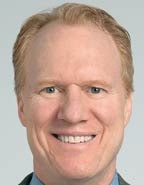 |
Michael S. Benninger, MD
Identify two strengths and vulnerabilities of our Academy and explain how you would propose to leverage those strengths and overcome those vulnerabilities to ensure future stability and success of the organization.
In the context of the Academy’s Strategic Plan, what changes do you envision will be necessary in our Academy over the next three to five years in order to meet the educational, research, advocacy, and fiscal challenges presented by evolving healthcare policy and legislation?
What is the most important issue facing otolaryngology—head and neck surgery, as a profession, in the next two to three years?
I have had a remarkable opportunity to contribute to the American Academy of Otolaryngology—Head and Neck Surgery as Chairman of the Board of Governors, Vice President, and Journal Editor. My 11 years on the Board of Directors have allowed me to see our many great strengths and resources. The most significant of these are the remarkable involvement of our engaged membership and a great balance between academic and private practice otolaryngologists. The Academy needs to continue to provide a broad set of resources for all of our members.
Despite these strengths, we have vulnerabilities. The implementation of healthcare reform and the ever-changing socio-economic and legislative environments will challenge us moving forward. There is a risk that we will be fractioned by pressures to maintain our practices, defend against other groups trying to expand their scope of practice into our areas, and meeting government and payer mandates. The future of otolaryngology and the role of the Academy in designing that future will require that we continue to come together as one specialty to represent the needs of our patients. This will require sustaining an engaged membership, strengthening our development of dedicated members and future leaders, and collaborating between our sister societies.
The future of the Academy is driven by our strategic vision and planning and there are a number of key objectives that need to be prioritized. The financial stability of the Academy is crucial to sustaining a strong membership and advocating for the ongoing member needs through our legislative, practice management, and academic agendas. We have to ensure that the costs of maintaining the Academy’s support structure yield the highest value on return and members’ dues are used wisely, so that we can grow our membership, and engage our members to be more active politically both for responding to healthcare reform and to support the growth of our practices.
Although we have many issues that will be facing our specialty, the overall shortage and maldistribution of otolaryngologists will challenge our ability to provide quality, equitable care. Although the impact of this worsening shortfall may be a few years off, we need to be proactive in evaluating the long-term threats to our practices and in finding solutions to improve distribution of ENT care, assuring access for patients, and protecting our critical roles. We must ensure that the coordination of care for the management of patients with otolaryngologic disorders needs to remain with the otolaryngologist. Our challenge is to meet this demand and distribution while retaining the critical role of supporting the best quality, safety, and appropriate care for our patients. A clear part of this is protecting and growing our practices, our practices that define the highest quality for otolaryngology patients. It is imperative that we advocate for appropriate reimbursement and fair policies through both government and private payers and continue to promote ethical but significant malpractice and tort reform. A focused Academy, an engaged membership, and experienced, strong leadership will allow us to meet these challenges.
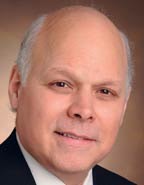 |
James L. Netterville, MD
Identify two strengths and vulnerabilities of our Academy and explain how you would propose to leverage those strengths and overcome those vulnerabilities to ensure future stability and success of the organization.
In the context of the Academy’s Strategic Plan, what changes do you envision will be necessary in our Academy over the next three to five years in order to meet the educational, research, advocacy, and fiscal challenges presented by evolving healthcare policy and legislation?
What is the most important issue facing otolaryngology—head and neck surgery, as a profession, in the next two to three years?
I am humbled, and honored, to be nominated for the role of President of our Academy. Throughout my career I have gained immensely from my membership in the Academy, and the benefits it offers to each of us. I am indebted to many of you, who sacrificed your time and energy to create this strong vibrant Academy. At this point in my life, I would cherish the opportunity to give back to the AAO-HNSF, to each of you as fellow members, by serving you through this position, a position of service to all who make up our Academy.
One of the remarkable strengths of our Academy is its extremely dedicated and well-trained workforce. Simply stated: each of you. The vast majority of you are highly respected in your communities for your service to your patients and the world around you. I have observed many of you, as you not only provide excellent care to your patients, but as you work in the community, serve through nonprofit efforts, head up church service programs, while many of you spend vacation time serving the poor through foreign medical missions. Many of you quietly serve at home as you unselfishly bring that segment of uninsured patients into your office and treat them with the same care and compassion as the insured patient in the adjoining room. Yet this excellent reputation built over many years of dedicated service is very vulnerable as we surgeons are being framed by our current health care reform as the “bad guys,” the “problem” that is responsible for rising cost of health care.
Another remarkable strength is our education programs. However, we have been educated in vertical silos. Our vulnerability is not the quality of our education but what we are being educated about. We are lacking in our education on healthcare policy, and how to negotiate and work with other individuals and groups who will be seated at the healthcare reform table.
A critical shift of our strategic plan will allow us to use these strengths to overcome these vulnerabilities. Through an Academy-sponsored national grid of outcomes data, we must function as a team to pool our data, to define the standards of quality head and neck care, and to demonstrate that we are uniquely qualified to deliver the most efficient, cost-effective ENT care. From this position of strength we can then frame ourselves as the quality care providers of all ENT care. We can then decide what we treat and what we allow others to triage for us within the looming framework of accountable care organizations and bundled care payments.
The most important issue facing not just otolaryngology—head and neck surgery, but all of medicine, is the unknowns of the massive healthcare reform that is staring us in the eyes. It is reality, something must change in how we deliver and pay for healthcare. We must rapidly pass through our denial and anger in order to become meaningful players at the healthcare reform table.
Otherwise we will be marginalized, and others will dictate our paths for us.
Candidates for Secretary-Treasurer-Elect (vote for one)
What is your particular experience or interest that would make you an effective Secretary-Treasurer of the Academy?
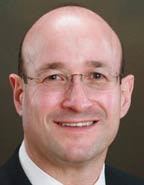 |
Gavin Setzen, MD
I have been deeply involved in the Academy since completing my residency. I am a private practitioner and president of a single-specialty group, with an academic faculty appointment, and I understand the complexities and challenges facing all otolaryngologists in the United States. It is imperative that the fiscal security and viability of our Academy be ensured, consistent with our strategic plan, so that we are able to provide education, research, and advocacy, coupled with a broad array of membership services to our members and the patients we serve.
I have held numerous leadership positions in the Academy, in organized medicine and in several community nonprofit organizations. I have developed executive, finance, and governance experience that qualifies me for this position. I have chaired the Board of Governors (BOG) Socioeconomic & Grassroots Committee and Legislative Representatives Committee for several years and was Secretary and Chair of the BOG. I am immediate past chair of ENT PAC. I have been involved in the Health Policy Commission, Practice & Payment Steering Committee, Nominating Committee, Specialty Advisory Council, and I am Chair of the newly formed Imaging Committee. I am President of the New York State Society of Otolaryngology and serve on the Medical Advisory Committee for the NYS DOH. I serve on the National Quality Forum (NQF) Imaging Steering Committee, and I am President-Elect of Intersocietal Commission for Accreditation of CT Laboratories. I have served on the finance, investment, and endowment committees and boards of directors for a large community nursing home, Temple (where I was treasurer as well), and Jewish Federation of Northeastern New York for the past decade.
I have served on the Executive Committee and Board of Directors of the Academy, and as immediate past chair of the Board of Governors, I have worked intimately with various committees, Academy staff and leadership in developing policy while tackling various socioeconomic and business of medicine challenges on behalf of our membership. By actively participating in the Academy’s strategic planning and budget process, I understand its breadth, its potential and certainly its constraints.
I am honored to be nominated for this position and if elected Secretary-Treasurer, I will be focused on helping the leadership prioritize the use of Academy resources to benefit members, by ensuring prudent fiscal discipline and oversight, while seeking to pursue new opportunities to enhance the Academy’s financial position.
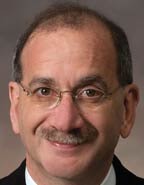 |
Mark K. Wax MD, FRCS(C)
I have had the honor of serving the AAO-HNS for over a decade. It has been my privilege to participate in the functions and administration of many aspects of the Academy, from being a member and chair of various committees to serving on the Board of Directors as the Coordinator for Education. These activities have allowed me to gain an understanding of how the Academy works. I have seen not only the direct result of the Academy’s efforts but have also been able to participate in many of the administrative and financial discussions. Being intimately involved with the meetings and educational activities at a senior level has allowed me to gain an understanding of the financial issues that we face.
For seven years, I had the honor of serving as treasurer of the American Head and Neck Society. In that time I was charged with developing a transparent budgeting process that council and membership could understand. The process of developing a budget for the many national and international meetings was exciting. Building consensus and understanding was my mission. During my tenure, the Society was able to maintain its mission and build its financial resources.
I have always believed that it is the responsibility of the Secretary-Treasurer of the Academy to maintain oversight over the fiscal property of the Academy. Doing so requires balancing the requests of the various constituencies with the available funds. I intend to ensure that the interests of all members are balanced and maintain the fiscal stability that the Academy has developed over the years. Transparency in the financial aspects of the Academy is a fundamental privilege of the membership that I intend to uphold. Finally, I intend to leave the Academy in as strong, if not stronger, position over the time of my tenure.
Candidates for Director At-Large (Academic) (vote for one)
In your view, what are the three most important elements of the Academy’s current Strategic Plan and how would you propose advancing them?
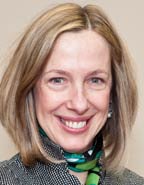 |
Carol R. Bradford, MD
I feel honored and humbled to be nominated as a candidate for the Board of Directors. I have had the privilege to serve on the Nominating Committee and the Core Study Section. If elected, I pledge my commitment to the Academy, its members and its mission. Our mission to empower otolaryngologists—head and neck surgeons to deliver the best patient care is achieved through education of the provider and the public, research to define the best treatment paradigms, and healthcare policy advocacy. In the present climate, healthcare policy advocacy is an increasingly important role your Academy leaders must play. We must work with policy makers to ensure that we can provide cost-effective, patient-centered, compassionate care in efficient clinical care delivery systems. I would encourage high quality research to define the evidence basis of safe, high-quality, cost-effective ear, nose, and throat care. As President-Elect of the American Head and Neck Society, I strongly support collaboration and synergy amongst the societies. Finally, as your Director-At-Large, I would serve humbly to incorporate member input to define and refine a vision that serves our collective membership.
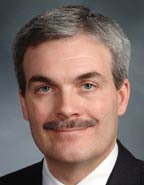 |
Michael G. Stewart, MD, MPH
The three most important elements of the Academy’s strategic plan in my opinion are: 1. represent the interests of the specialty in federal and state legislative initiatives; 2. build a sustainable infrastructure to test and promote adoption of research and quality products; and 3. create and sustain membership and specialty unity.
With changes in healthcare legislation and reimbursement, it is vitally important that the Academy be proactive in representing the specialty’s interests so that we can continue to provide the best patient care. I will strongly support Academy efforts in this arena.
The Academy should play an important role in supporting research that answers clinical questions, demonstrates the benefits of otolaryngologic treatment, and supports rational evidence-based guidelines. The Academy has a long track record of facilitating data collection and multicenter outcomes-based research. I have been part of these efforts in the past, and I would use my experience to support and assist the Academy.
We are a small specialty, and cannot allow ourselves to become fragmented by subspecialty or geography. However, specialty and regional societies often have expertise and connections which benefit the larger group. I would facilitate continuing collaboration with the subspecialty societies on many topics, including clinical research.
Candidates for Director At-Large (Private Practice) (vote for one)
In your view, what are the three most important elements of the Academy’s current Strategic Plan and how would you propose advancing them?
 |
Lisa Perry-Gilkes MD
Accountability, advocacy, know-ledge, and education are elements of the Strategic Plan I can champion.
Accountability is medicine’s cornerstone. It is the thread that runs through our pledge, the ACS pledge and the Hippocratic Oath. I am a mid-career solo practitioner. Physician viability is paramount. I will focus on “accountable care,” reimbursement, patient access issues. “Ongoing Professional Practice Evaluation” affects every physician regardless of practice type. I would work with the Academy to become a source of guidance for members on these and other issues which can place restraints on our practice.
My advocacy experience comes from 27 years of activity in organized medicine via the Academy, CMA, MAG, NMA, JSAC, and the AMA. I have visited the capitols of California, Georgia and our nation’s capital to work with legislators to affect healthcare policy. Resolutions I wrote passed through state societies to the AMA and have molded state and national policy. As an ENT PAC member, I would continue to move our policies forward.
Knowledge and education are medicine’s foundation. We do this well! With our grassroots organizations I would advocate to further educate the public on the concept of “right care right place” for ENT care.
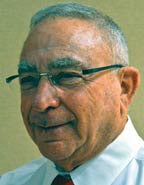 |
Paul T. Fass, MD
The nomination for Director At-Large reflects my commitment to advance the cause of “good medicine.” AAO-HNS, given our limited membership size, must put forth the maximum effort during these demanding times.
A “Lifetime of Learning” experience must be a Board priority. We must lead the way with multiple affordable forums to disseminate new evidence-based information. Quality information development is a primary goal of the Board. Our relationship with the Specialty Society Advisory Council will be a resource for new ideas and information. Specialty societies have relationships outside of ENT, guaranteeing a steady flow of knowledge across medical disciplines. A steady flow of new information is of paramount importance. The Board of Directors must look to the corporate world and government to support our researchers and the educational process.
The final product is an Academy that supports the interests and needs of all otolaryngologists and their patients. This goal can only be achieved by providing good governance and transparency. As a member of the Board of Directors, I will encourage the advancement of these precepts and would like us to provide the arena to unleash all that otolaryngology has to produce.
Candidates for Nominating Committee (Private Practice) (vote for two of four)
What do you see as the priorities of the Nominating Committee in selecting the future leaders of our Academy?
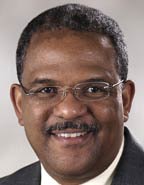 |
Reginald F. Baugh, MD
The priorities of the Nominating Committee should be to identify those leaders who can best navigate the troubled waters of the future. Clearly, no one can foresee the challenges that lie in our future. The events in Tunisia, New Zealand, or even the fate of Obamacare provide ample witness to our ability to predict the future. Future leaders will have to listen carefully to all portions of the membership as they search for the optimal way forward as the answer is not the sole providence of any group. A diverse range of experiences in our leaders will provide the necessary nuances and depth for optimal leadership deliberations and outcomes. Change will favor those leaders who are humble, principled otolaryngologists with the verbal and written skills to articulate their opinions within a group. They must be principled without being an ideologue, pragmatic without being rudderless, and hardworking. Fortunately, our Academy has a robust supply of talented, dedicated men and women anxious to serve.
 |
Linda S. Brodsky, MD
Leadership comes from more than who you know or what you know. We otolaryngologists are a wonderfully diverse group of individuals who are united by a common mission and vision. The priorities of the Nominating Committee must be to identify leaders who cannot only keep us on a dynamic course of action, but also can unite and energize our membership to face the many challenges of the 21st century.
“The best, the brightest with the broadest set of experiences.” Bringing together leaders who complement one another, each with demonstrated vision and “out of the box” thinking. Leaders who have the power to persuade and the interest to pursue the most important issues facing us as a specialty.
I bring unique experience from both sides of the practice spectrum. My first 24 years were spent in academic practice, the last four in group private practice. This divide must be bridged by the Nominating Committee by identifying the next generation of leaders who will find common ground through collaboration and cooperation. I promise to bring vision and energy to the Nominating Committee in its important function of finding the best candidates worthy of leadership of the American Academy of Otolaryngology—Head and Neck Surgery.
 |
Karen Linnea Peterson, MD
It is a privilege to be considered for an appointment to the Academy’s Nominating Committee. I have been active in Academy activities for 20 years. During that time I’ve served on several academy committees including the Young Physicians Committee, Humanitarian Efforts Committee, Home Study Course Faculty, and Voice Committee. In addition, I had the honor to hold a guest position on the Academy’s Board of Directors for two years.
We are at a crossroads in medicine. As clinicians, we face the challenge of guiding and executing the ultimate shape of healthcare reform. Among the varied economic, political, social, and technological forces that are competing for attention, physicians must find their voice to speak on behalf of their patients. We must advocate for the resources needed to provide the best quality care. We need thoughtful, forward thinking leaders who are able to put their egos aside, to engage and empower our diverse membership to utilize their talents for common goals.
As an otolaryngologist, I am surrounded by skilled and dedicated colleagues. Helping to identify the best candidates to engage the members of the Academy with thoughtful and responsive visions as a member of the Nominating Committee would be an honor.
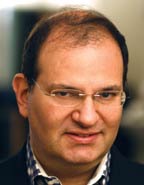 |
Michael A. Rothschild, MD
I feel that our academy needs to keep pace with the rapidly changing environment in which we practice medicine in the 21st century.
The Nominating Committee must select leaders who understand the implications of modern communications and health information technology, evolving national and local health care legislation, the role of medical research, and the ever-changing relationships between physicians, patients, and third party payers.
I believe that my leadership experience in our field will be an asset to the Nominating Committee. I served as the chairman of the Information Technology Committee for the AAO-HNS from 2000 to 2008, and I am currently the president of the American Broncho-Esophagological Association. I hope to continue contributing to our specialty at a national level if the membership honors me by electing me to this position.
Candidates for Nominating Committee (Academic) (vote for two of four)
What do you see as the priorities of the Nominating Committee in selecting the future leaders of our Academy?
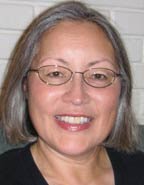 |
Karen J. Doyle, MD, PhD
I am very happy to run for a spot on the AAO-HNS Nominating Committee. For the past 18 years I have enjoyed serving on many Academy committees, including the Program Advisory Committee, Task Force on New Materials, Home Study Course Faculty, CORE Grant Review, Practice Guidelines for Otitis Media with Effusion Committee, Women in Otolaryngology Committee, Research Education Committee, and multiple subcommittees of the Hearing Committee. Thanks to this involvement I have had the pleasure of meeting and befriending many fine individuals from all over the country who also enjoy serving the Academy. As a potential member of the Nominating Committee, I will work to identify a diverse group of candidates who are willing to work hard during their terms to fulfill the mission of the Academy.
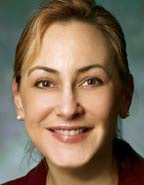 |
Christine G. Gourin, MD
The line between academic and private otolaryngologists has become increasingly indistinct as medicine in the 21st century faces unique, immediate challenges to our profession’s survival. Future leaders will need to address the issue of decreasing clinical revenue per RVU, the intrusion of external forces on clinical decision-making, and healthcare reforms that further threaten to decrease reimbursement without addressing long-needed malpractice reform. These challenges are not unique to otolaryngologists but are common to all, as research funding is flat or decreasing, and clinical revenues are declining. Therefore, in order for academic and private practitioners alike to be successful, clinical efficiency and productivity must be optimized, and quality care must be recognized and rewarded.
The Academy has strength in numbers. The top priority of the Nominating Committee must be to select passionate, skilled, and visionary leaders who have an effective voice for our number, champion the causes we share in common, and effect change on behalf of all Academy members and patients.
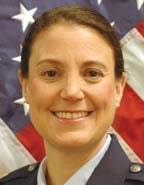 |
Cecelia E. Schmalbach, MD, MS
Every AAO-HNS member has been impacted by our changing political and economic climate. It is imperative that we move forward with a unified, strong voice to address the needs of our patients and our specialty. Our future Academy success lies in its leadership. The priority of the Nominating Committee requires: 1.) Understanding of current concerns shared by members, the AAO-HNS strategic plan, and the political context in which we reside. 2.) Identifying driven and dedicated visionaries who are forward-thinking, yet can learn from others. Selection for leadership must be based on expertise and commitment, not longevity or popularity. 3.) Ensuring that diversity is represented within leadership. We must use the expertise of all subspecialties and platforms (academic, private, government, military, rural, and urban). As a head and neck surgeon who trains residents while jointly appointed to a military center and local university, I appreciate the importance of diversity. 4.) Leadership development is imperative. We must include young members’ new ideas, while embracing the seasoned members who serve as mentors.
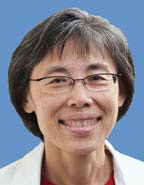 |
Maisie L. Shindo, MD
The Nominating Committee’s role is to ensure that the Academy’s leadership positions are filled with the most qualified members. The challenge is to select candidates who have a genuine interest in representing constituents as we confront reimbursement, technological, quality, political, and management issues. Furthermore, the candidates must have the ability to unify a very diverse membership. These leaders must understand the full scope of otolaryngology, integrate the academic and research mission, and be sensitive to socioeconomic issues. Through many years of service in the Academy and organizations such as the American Head and Neck Society and American Board of Otolaryngology, I have had the privilege of working with many individuals from both academic and private practices who have great enthusiasm and leadership qualities. It would be a privilege and an honor to help select candidates for the Academy who would best direct and accomplish the goals of the membership.
Candidate for Audit Committee (vote for one of two)
What is your particular experience or interest that would make you an effective member of the Audit Committee of the Academy?
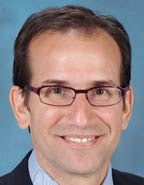 |
Kenneth W. Altman, MD, PhD
It is my great pleasure to run for election to the Audit Committee of the AAO-HNS. The committee’s important role is to confirm that the budget is aligned with the Academy’s strategic plan. This is a critical mission that ensures greater accomplishments in the future, so an audit committee member should have a global understanding of the Academy’s function, as well as training in the ability to evaluate financial statements. I have both of these requirements, and I also have a passion for the Academy. As an active member in committees, associate editor for the Journal, CORE grant reviewer, and involved with presenting at the scientific and research programs, I believe that I have a great understanding of the value of this work. Adding to this perspective is my devotion to these and other activities outside the Academy, such as instruction courses, resident and fellow education at the Mount Sinai Medical Center, publishing, and community involvement. I am also the upcoming treasurer of the American Laryngological Association, and have a background in accounting and finance from a recent program in Managing Healthcare Delivery at Harvard Business School. I look forward tothe opportunity to serve on this committee.
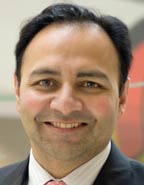 |
Sanjay R. Parikh, MD
Having served both the Academy‘s Board of Directors and Board of Governors, I have had the privilege of gaining insight into the Academy’s mission, vision, and operations. On your Audit Committee, I would fully commit myself to ensuring careful and judicious use of Academy resources to serve its members. At a time when economic woes are upon us, we must make certain that the Academy uses its financial resources wisely and ethically to serve both the private practice and academic houses of otolaryngologic medicine. We all work hard to pay our Academy dues and the Audit Committee must make sure that every dollar is used effectively to empower otolaryngologists.
(vote yes or abstain)
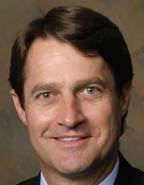 |
David W. Eisele, MD (incumbent unopposed)
I am very pleased to be nominated to continue to serve on the Audit Committee for the Academy. I have enjoyed my tenure as a committee member and have strived to further the goals and objectives of the Academy in this important role. I have served other otolaryngology societies in leadership roles. I have done my best to work closely with other Audit Committee members and will continue to do so.
Candidate for AMA HOD Chair (vote yes or abstain)
What is your particular experience or interest that would make you an effective AMA House of Delegates Chair for the Academy?
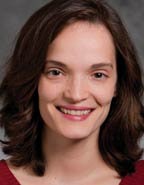 |
Liana Puscas, MD (incumbent unopposed)
My particular experience for this position is the length and breadth of my involvement in the AMA. I have been active since I was a first-year medical student and attended my first meeting in June 1992. Since then I have served in many capacities in the AMA including committees of the Medical Student and Young Physician Sections, on the governing council of the Resident and Fellow Section, on a House of Delegates Reference Committee, and on the Board of Trustees. This is in addition to regular participation in the annual and interim meetings of the House of Delegates. Like any policy making body, the AMA has its own procedural mechanisms, and these take time to learn so they may be used for the benefit of the group being represented. My extensive experience with the AMA helps me to effectively represent our Academy and its members.